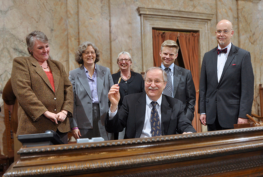Dear friends and neighbors,
Washington’s abundance of stunning and varied natural resources has made it a great state in which to live and work. As we face increasing threats from climate change, the Legislature is working to sustain and enhance our natural resources for future generations.
This session, we took action to protect threatened species, improve critical habitats, mitigate wildfire risk, and support agricultural production.
Restoring critical habitats
- HB 2045 supports the recovery of salmon populations by facilitating the removal of barriers that interfere with fish migration. The bill authorizes local governments and the state to enact Adopt-a-Fish Passage programs to accept donations to pay for the removal of fish passage barriers.
- SB 5972 protects pollinators by prohibiting the use of neonicotinoid insecticides on backyard plants. Pollinators such as bees, butterflies, birds, beetles and bats are essential to agricultural production and home gardens. This bill complements SB 5934, legislation to increase pollinator habitat by encouraging the inclusion of pollinator-friendly landscapes around new commercial buildings.
Protecting threatened and vulnerable species
- HB 1153 protects octopuses and near-shore environments by prohibiting octopus farming in Washington state. Though there are currently no operational octopus farms in the state, interest in commercial production of octopus has increased globally due to its popularity in many cuisines.
- HB 2424 supports the management of gray wolves in northeastern Washington by directing the state Department of Fish and Wildlife to work with the Confederated Tribes of the Colville Reservation to update the 1998 cooperative agreement.
- HB 1226 expands protections for threatened and endangered species by requiring a license to fish smelt, crawfish and carp. Licensing allows for better monitoring and regulation of smelt, a threatened species under the Endangered Species Act.
- HB 2293 will help identify threats to salmon populations by creating the Avian Salmon Predation Work Group. The work group will identify bird species that prey on juvenile salmon and the extent to which they hinder the recovery of salmon populations and will develop recommendations for remedies.
Protecting forests and air quality from wildfires
- SB 6120 directs the state Department of Natural Resources (DNR) to produce maps identifying areas that face the greatest risk of wildfires.
- SB 6121 will speed the removal of slash — piles of dead forest growth in timber areas — by allowing a method of incineration that releases fewer emissions and creates biochar, a by-product useful in agriculture.
Improving public management of forestland
- HB 1818 will help public agencies and local jurisdictions purchase forestland for the benefit of the public by waiving a compensating tax for private buyers of land that continues to be managed as forestland.
- SB 5785 makes it easier to plan and permit volunteer activities on land managed by the Department of Fish and Wildlife by protecting the DFW from liability when collaborating with volunteers and nonprofits to maintain, protect and enhance state lands.
- HB 2165 encourages the hosting of events and recreation on land managed by DNR by ensuring property owners are not liable for unintentional injuries to users on their lands.
Protecting agricultural production
- SB 5784 updates and increases the amount of funds the state pays to farmers to mitigate losses due to crop damage from deer and elk. The bill also establishes a pilot program to collar elk in herds that locate near farms in the south-central region of the state so that farmers there can more efficiently deploy hazing techniques to prevent crop damage.
- HB 2147 protects agricultural crops by creating a new state treasury account to address emergent pests and diseases that threaten the production of agricultural commodities, public health, or the environment.
- HB 1752 improves water resource management in the Columbia Basin Project by allowing irrigation of additional acreage under existing water rights so long as the increased capacity doesn’t impede other users’ water rights.
Ensuring food product integrity
- SB 5799 protects consumers from false claims regarding halal foods. Much like other common consumer protections, such as the 1985 statute that ensures truth in the advertising and sale of kosher foods, this bill makes it a crime to knowingly sell food as halal unless it meets Islamic dietary guidelines.
Thanks for taking the time to read my newsletter. If you missed my previous updates on gun safety, K-12 education, environmental protections, affordable housing, LGBTQ+ rights, public safety, transportation, health care, higher education, community projects, worker protections, bills inspired by community, or Cal Anderson’s legacy, they are available on my website. Please reach out with any questions at Jamie.Pedersen@leg.wa.gov.
Best wishes,
Jamie




